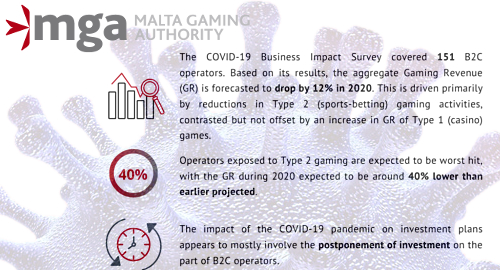 Malta’s gambling regulator expects its online sports betting licensees will see their revenue fall by 40% this year due to the impact of COVID-19.
Malta’s gambling regulator expects its online sports betting licensees will see their revenue fall by 40% this year due to the impact of COVID-19.
On Thursday, the Malta Gaming Authority (MGA) released the results of a survey into the impact of the COVID-19 pandemic on Malta’s gaming industry. The Business Impact Survey, conducted in April, queried 151 business-to-consumer (B2C) licensees as to how their current and future operations would be affected by the pandemic.
On the whole, B2C operators expect their 2020 gross gambling revenue to come in 12% below 2019’s results, and the MGA said this would likely convince most B2C licensees to postpone investment plans to preserve financial liquidity until the pandemic situation clarifies.
Sports betting-focused B2C operators expect a revenue decline closer to 40%, and the MGA noted that the sports decline would be “contrasted but not offset by an increase” in online casino revenue.
The 64 business-to-business (B2B) licensees queried in the survey expect their 2020 revenue to take a 20% year-on-year hit, and between 33% and 38% of B2B operators plan to postpone unnecessary investment.
Operators holding both B2B and B2C licenses also expect a 20% revenue hit and two-thirds of these hybrid operators are postponing their 2020 investment plans.
Malta’s land-based gaming sector was ordered to shut in March to minimize further COVID-19 transmission but local health authorities have begun allowing the sector to reopen. Lottery booths were allowed to reopen on May 4, albeit with certain safety measures still in place (including no TV-based games to prevent lingering in confined spaces).
Gaming parlors followed suit on May 22, but for sports betting only and customers were required to exit immediately after placing their over-the-counter wagers.
The importance of the gaming industry to Malta’s economy can’t be understated, accounting for 13.2% of overall economic activity in 2018, nearly two points higher than in 2017. The 2019 figures are expected to be released in July.





